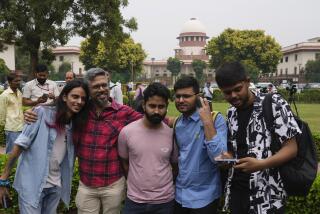India Lawyers Balk at Family Court Plan
- Share via
NEW DELHI — Ritu Sharma says lawyers came close to destroying her marriage last year with a go-for-the-jugular courtroom battle.
The lawyer for her husband, who had petitioned for a divorce, painted Sharma as unfaithful and cruel. Her attorney responded by trying to demolish her husband’s reputation, bringing on an escalating emotional free-for-all.
But then a sympathetic judge put a stop to the legalistic squabbling and urged the couple to try counseling. She and her husband reconciled.
“The judge saved our marriage,” Sharma now says.
Legal reformers in India say such outcomes would be more common if marriage counselors were brought into the courtroom--and lawyers were, to an extent, kept out. That’s the thinking behind plans to establish special courts across India to handle divorces and child support cases.
The idea, not surprisingly, has met stiff resistance from the legal profession. In late April, lawyers seeking to delay a plan to open family courts in New Delhi in July staged a four-day strike that paralyzed courts in the capital.
The strike caused a setback of at least six months in trial courts and three years in the appellate High Court, legal experts say. Indian courts are notoriously slow, and the strike meant thousands of cases had to be postponed and rescheduled in already overcrowded hearing schedules.
A lawyer earns a minimum of $115 for arguing a divorce case if it is settled quickly through mutual consent, and a prolonged legal battle, of course, means more money. But the lawyers contend they are standing on principle in opposing the family court plan.
“This act amounts to interference in our fundamental rights,” said Jatan Singh, secretary of the New Delhi Bar Assn. in a letter to New Delhi’s governor, Tejinder Khanna. “It will deprive the litigant of his constitutional right to choose a lawyer. . . .”
Family courts are to be headed by specialized judges assisted by marriage counselors and medical experts. Lawyers would not be required, but couples could seek the assistance of a legal expert who would be limited to a nominal fee, said Kusum Kumar, an associate law research professor.
The courts are to be set up in informal offices around the city, giving couples privacy from the property disputes, rent fights and contract troubles that crowd New Delhi’s civil courts.
In a similar experiment, separate courts headed by women judges were set up 2 1/2 years ago in New Delhi to handle crimes against women, especially dowry disputes. Husbands and in-laws frequently impoverish a wife’s family by insisting on gifts--cash, cars and electrical appliances--and mistreat or even kill a bride if they are not satisfied.
Romy Chacko, an attorney, agrees that traditional courts do not provide an atmosphere “conducive to handling the sensitive issues” of divorce because of their contentious nature and prolonged hearings stretched over months.
Chacko supports the idea of family courts but thinks lawyers should continue to play an important role. Illiterate women are particularly in need of legal counsel, he said.
Court records are full of stories of the system failing Indians with troubled marriages--and not all of the victims are women.
For example, court records tell of J.L. Nanda, who separated from his wife in 1971 and spent the next 15 years battling her in court over whether to divorce. Nanda died last year a lonely man--neither divorced and able to remarry nor reunited with his wife and son.
Women’s organization began pressing the government to set up family courts in the 1970s. They tasted success in 1984 when Parliament enacted legislation calling for family courts across the country.
But implementing the law was left to local government, and few states have acted on it. In the Indian capital, which is legally similar to a state, the new courts are still scheduled to open in July, but further strikes by lawyers could delay that.
More to Read
Sign up for Essential California
The most important California stories and recommendations in your inbox every morning.
You may occasionally receive promotional content from the Los Angeles Times.








